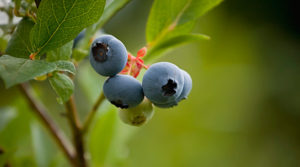Bilberry is a plant. The dried, ripe fruit and leaves are used to make medicine.
Contents
Uses
Bilberry has a long medicinal history in Europe. It has been used to treat anything from kidney stones to Typhoid fever. During World War 2 British pilots noted that Bilberry jam before a flight dramatically improved night vision. Modern research now supports these claims.
Benefits
- Great for eye health. They can help to prevent damage to important parts of the eye such as the retina. Also helps improve night vision. Great to take to help prevent diseases of the eye such as macular degeneration, cataracts, and glaucoma. Bilberry also helps to strengthen capillaries in the eyes which also help protect the eye from damage.
- Reduces excess sugar in the blood, so it is beneficial to diabetics.
- Can help regulate hypoglycemia if used over a period of several months.
- Take regularly for heart and circulatory system health. Antioxidants and anthocyanosides work together to help reduce bad cholesterol levels. Helps to strengthen capillaries all over the body, so they are used to treat varicose veins and hemorrhoids, and are great for helping the blood circulate freely through the body.
- Stimulates the urinary system and strengthens bladder and kidney function.
- Used to treat urinary infections, so it is often combined with cranberry or Uva Ursi Leaf for this purpose.
- Due to high levels of tannins, it has strong anti-inflammatory properties that help to treat diarrhea (especially in children since it is such a mild herb), hemorrhoids, and colon or intestinal inflammation.
- Helps to control free radicals in the body. Free radicals are often cancer causing, so it is beneficial as a cancer preventative.
- Anti-inflammatory properties also make bilberry useful for treating rheumatism, arthritis, and gout.
Cautions
The dried, ripe fruit of bilberry is LIKELY SAFE for most people when eaten in typical food amounts.
Bilberry fruit extracts are POSSIBLY SAFE when taken by mouth for medicinal uses for up to one year. Also, a specific combination product (Mirtogenol) containing bilberry and French maritime pine bark (Pycnogenol) has been used safely for up to 6 months.
Bilberry leaf is POSSIBLY UNSAFE for most people when taken in high doses or for a long time.
Special Precautions & Warnings:
Pregnancy or breast-feeding: Not enough is known about the use of bilberry during pregnancy and breast-feeding. Stay on the safe side and avoid use.
Diabetes. Bilberry leaf might lower blood sugar. Taking bilberry leaves along with diabetes medications might cause your blood sugar to go too low. Monitor your blood sugar closely.
Surgery: Bilberry might affect blood glucose levels. This could interfere with blood sugar control during and after surgery. Stop taking bilberry at least two weeks before a scheduled surgery.
Interactions
No interactions are known. Please consult your pharmacist.
Other names
Airelle, Arándano, Bilberry Fruit, Bilberry Leaf, Black Whortles, Bleaberry, Blueberry, Brimbelle, Burren Myrtle, Dwarf Bilberry, Dyeberry, European Bilberry, Feuille de Myrtille, Fruit de Myrtille, Gueule Noire, Huckleberry, Hurtleberry, Mauret, Myrtille, Myrtille Européenne, Myrtilli Fructus, Raisin des Bois, Swedish Bilberry, Trackleberry, Vaccinium myrtillus, Whortleberry, Wineberry
References
Source: HerbsWisdom, http://www.herbwisdom.com/herb-bilberry.html
Savvyteasandherbs, http://www.savvyteasandherbs.com/products/Bilberry-Fruit-Powder.html
WebMD, http://www.webmd.com/vitamins-supplements/ingredientmono-202-bilberry.aspx?activeingredientid=202&

